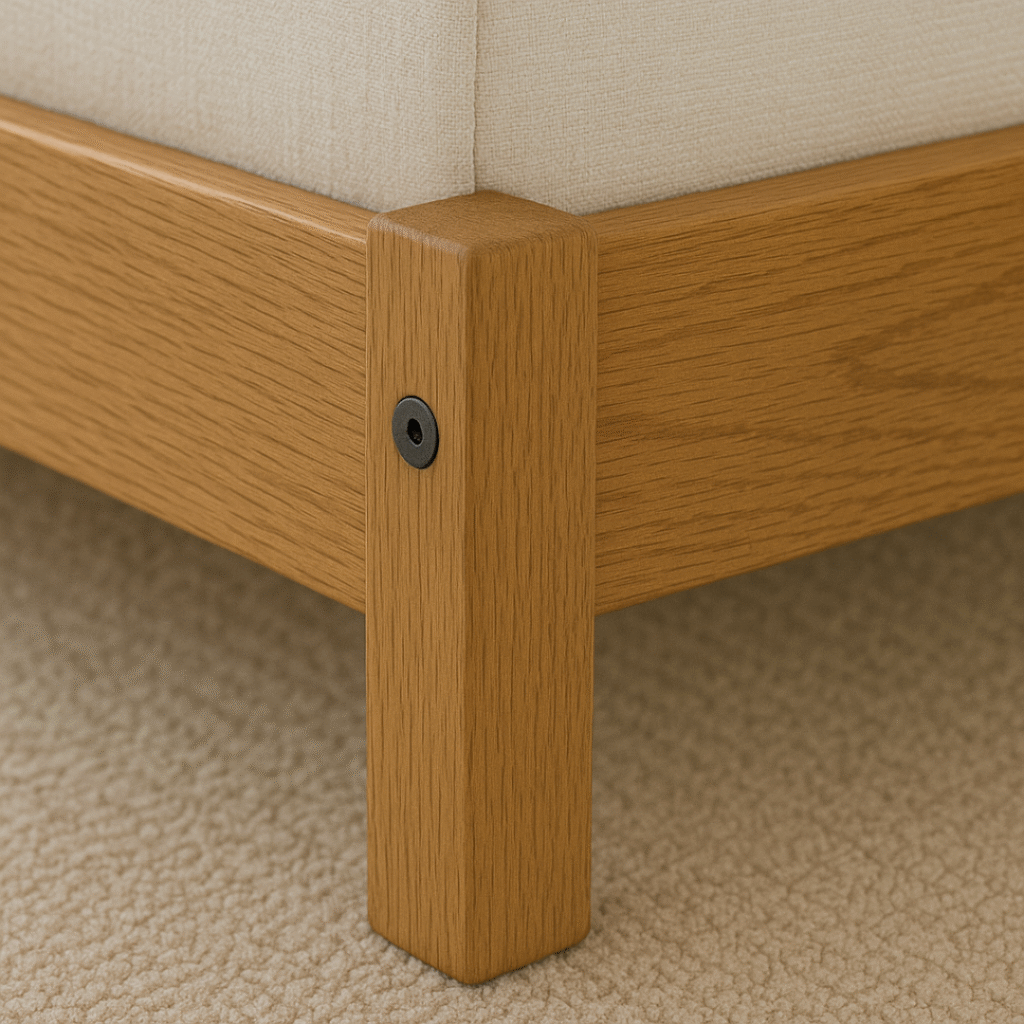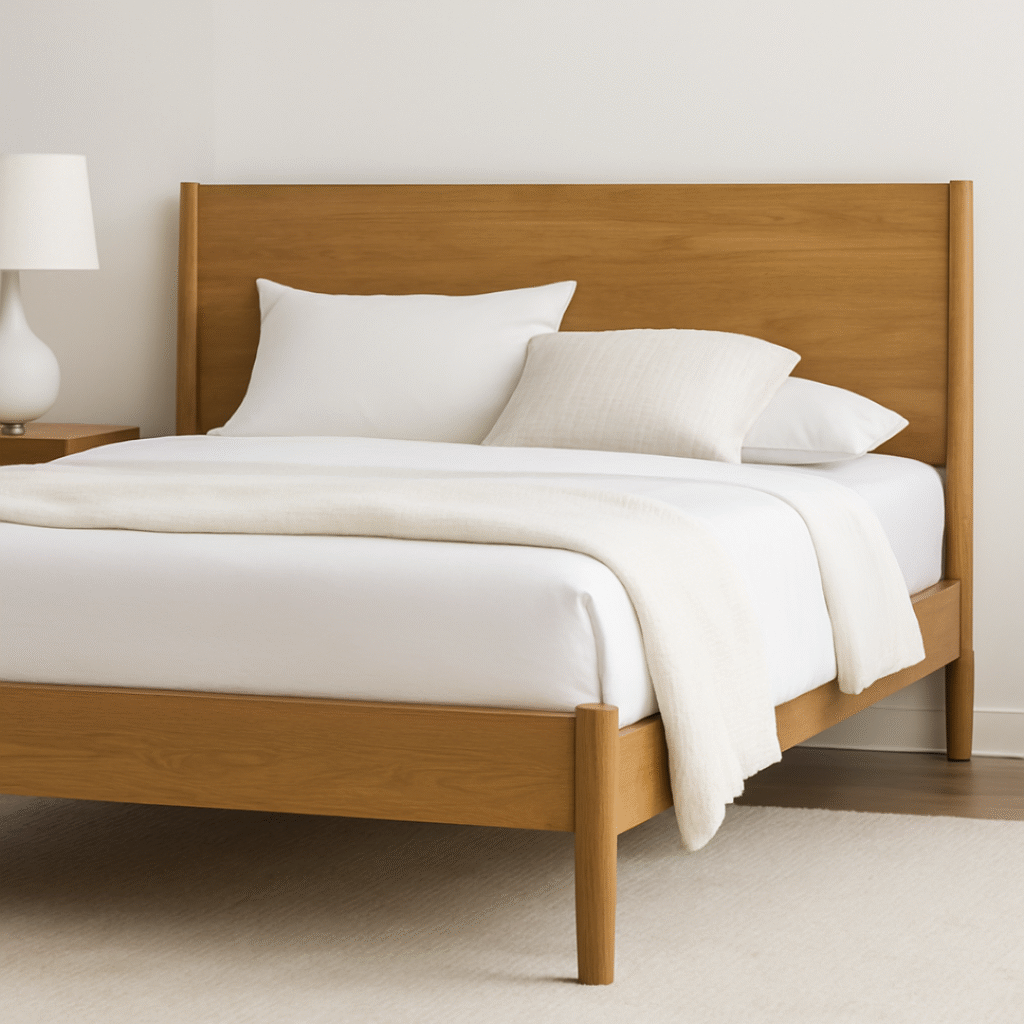Key Factors to Consider for Durability & Silence
1. Material Quality: Steel vs. Hardwood
- Steel Frames
- Pros: High tensile strength, warp‑resistant, supports heavy loads
- Cons: Can squeak if not properly isolated, so look for rubber bushings or welds
- Hardwood Frames
- Pros: Naturally quiet and timeless in appearance
- Cons: Subject to seasonal movement; avoid lower‑grade composites
2. Sturdy Construction & Support
- Center Support Rail & Legs: Essential to prevent mattress sag and frame twist
- Slat Spacing ≤3″ or Solid Deck: Supports foam mattresses and avoids dips
- Reinforced Joints: Welded steel corners, mortise locks, structural braces
3. Noise‑Proof Features
- Locate frames with rubber grommets, felt washers, or nylon bushings to isolate metal contact
- Secure bolts to specified torque and apply thread‑lock compound for ongoing stability
- Use cushioned slat clips or rubber tape to dampen slat‑frame contact
4. Ease of Assembly & Maintenance
- Opt for tool‑free or easy‑assemble components—particularly helpful for renters
- Choose hidden or recessed fasteners for a clean look
- Ensure replacement parts are readily available
Top Squeak‑Free, Durable Bed Frames

emBrace® 360 Steel Platform by Bed Architecture
- Strength: 4,400 lbs+ capacity & full‑length steel rails
- Quiet: Polymer isolators silent metal contact points
- Bonus: No support pole allows extra legroom and under‑bed clearance
Zinus Heavy Duty Steel SmartBase
- Strength: 4,400 lb capacity with strong metal slats
- Silence: Felt‑lined slats absorb movement noise
- Design: Tool‑free assembly in minutes
Mellow Naturalista Solid Wood Platform
- Strength: Solid hardwood slats with center beam
- Quiet: Tight timber joints produce no squeaks
- Style: Great fit for Scandinavian and eco‑friendly interiors
PlushBeds Quiet Balance Steel Frame
- Strength: Steel base with added center reinforcement
- Quiet: Polyurethane bushings on all metal contact points
- Luxury: Designed for memory foam and latex comfort
How to Choose the Right Durable Bed Frame

Match to Your Sleep Needs
- Steel → high durability, minimal upkeep
- Hardwood → rich visuals and natural silence
Verify Capacity
Add 25% buffer—for two sleepers plus mattress, pick 4,000 lb+ rated frame
Inspect for Noise Control
Seek descriptions mentioning anti-squeak hardware or rubber isolation components
Prioritize Practical Assembly
For renters: choose frames with clear, tool-free instructions and strong hardware
Visual Element Recommendations
- Infographic: “Durable Bed Frame Features”
Alt text: Diagram showing center rail, reinforced corner, rubber grommets - Product Photo/Video: emBrace® 360 assembly—use text overlay “Anti-squeak tech tested”
Maintenance Tips for a Long-Lasting Frame
- Tighten bolts after first two weeks, then every 6 months
- Add liner pads under slats & legs for vibration control
- Vacuum underneath to prevent dust building
- Retighten headboard bolts to avoid looseness
Conclusion
Choosing a durable bed frame requires focus on material quality, structural support, noise damping, and practical assembly. Steel or hardwood frames with reinforced parts, anti‑squeak design, and proper maintenance will provide silent, comfortable sleep for years.
Take the next step
- Calculate total load (people + mattress) + 25%
- Choose materials & structure accordingly
- Assemble carefully and Maintain regularly
Share this guide if it helped—or leave your question below!
FAQs About How to Choose Durable Bed Frame
What is the most sturdy bed frame for heavy people?
Steel frames with thick tubing and center support rail are best for heavy-duty use.
How do I prevent a bed frame from squeaking?
Tighten all bolts to spec, add rubber/felt pads, and check hardware periodically.
Are solid deck bed frames quieter than slats?
Yes—solid plywood decks eliminate slat movement and friction.
What bed frame materials last longest?
Powder-coated steel and kiln-dried hardwoods (oak, maple) resist wear and noise.
Can I DIY reinforce a squeaky bed frame?
Yes—add thread-lock compound, rubber shims, and tighten all joints.




